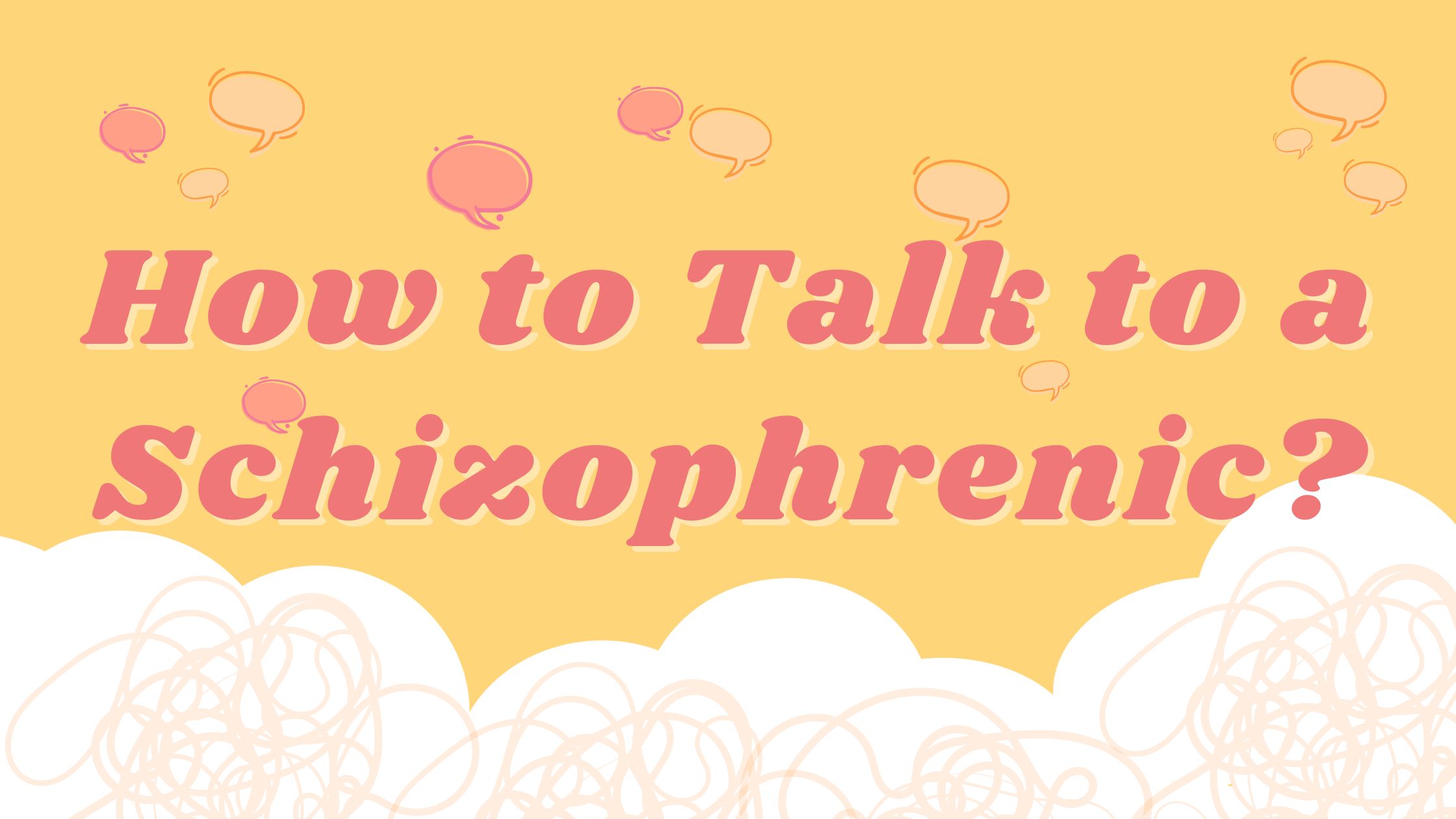
How To Talk To Someone With Schizophrenia
Communicating with a loved one who has schizophrenia and is experiencing delusions is indeed challenging, frustrating, and even frightening. This is especially so when schizophrenics get paranoid. For example, when schizophrenics say they refuse treatment, you may feel the need to force communication, which should not be the way.
Then, how can you help?
Why Forcing Your Idea Or Opinion Does No Good
You may want to reason with your loved one when he/she is having a delusion. You force your opinion and reasoning with the hope that he/she can see it better. However, this may lead to further misunderstandings or arguments. You will feel more anxious and frustrated when it is not accepted.
Schizophrenics’ moods are often affected by the delusions that they are going through. When in their delusions, it is difficult for them to reason things with clarity. The false beliefs seem too strong and real to them as they are wired differently. It is immensely difficult for them to get rid of the feelings. Thus, adding your opinions further fuels their suspiciousness and anger, leading to misunderstandings and frustrations.
How Does Schizophrenia Affect One’s Speech and Communication?
When I am experiencing symptoms, I tend to talk less as I find it difficult to express myself. It is always a struggle to make others understand how I think and feel. It requires a great deal of effort, for my thoughts are scattered. Random intrusive thoughts keep popping into my mind uncontrollably without warning. Subsequently, this makes me very uncomfortable being in the company of others.
At times like this, my emotions or feelings appear to be dull and flat during the course of conversation. This condition is also known as alogia or flattening.
Talking To Someone With Schizophrenia Is Challenging
When times are tough, my mind is not calm as I have to deal with the intrusive thoughts and voices. I start to feel anxious and do not feel like talking. Instead, I just wish to be in my own safe space till I calm down. In my home, we have the mantra, ‘Always de-escalate’.
You may be frustrated because you cannot get through to your loved one, and you find difficulty in communicating with him/her during such times. It is okay to feel confused, frustrated or even scared. At times like this, take a step back and give him/ her time to calm down. Take a deep breath and give yourselves some space.
How to De-escalate when a Schizophrenic is Going Through an Episode?
From a caregiver‘s perspective, it is very hard to watch your loved one having a tough time, especially if you are a parent. The instinct to help or control the situation will be so strong that you may take the wrong step. Therefore, the methods mentioned below may help when speaking to a schizophrenic who is going through an episode.
Have an open mind
Keep an open mind while listening to his/ her delusions. It may be scary if you are hearing them for the first time. It can even be frustrating as he/ she may tell you the same delusion repeatedly.
Never be fearful of them
Most importantly, do not be afraid of them when they are delusional. It will hurt and scare them even more, resulting in him/ her being more negative. It is also crucial not to force your point of view at this time.
When I am in my delusion, the voices can get very loud, especially when a point is excessively repeated. When that happens, it is hard for me to be convinced through logical reasoning, as the false belief seems so real.
So, just listen to them when they express themselves because schizophrenics cannot help it, as the delusions can be overwhelming.
Trust
Having trust for each other is crucial. Never gaslight or lie to him/ her. Sometimes, you may be desperate and try to tell him/ her things that are not true to make him/ her feel better. Do not do so.
If caught lying or gaslighting, the trust will be broken. As schizophrenics deal with a lot of suspiciousness, lying to him/ her will makes things worse. He/ she may assume that you can no longer be trusted and his/ her emotions can spiral down badly.
If you are being told a delusion (e.g. I’m being tapped), it is best to just accept and say that you understand. Try not to judge. Then, ask if he/ she needs anything to make him/ her feel better. Show encouragement and support.
Be the space for trust and comfort. Be the person he/ she can always go to when times are hard.
Patience
You usually will not get the response you want when communicating. There may be just silence or even anger. Never take it personally. Instead, continue talking in a calm manner. Schizophrenics do not want to feel judged for the delusions they are experiencing.
It is already traumatising to feel like they are ‘losing their mind’. Thus, a little patience will go a long way. Listen patiently and try to understand what he/ she is expressing. Give him/ her time to tell what he/ she is going through or what is on his/ her mind without rushing.
You can ask questions like, “How are you feeling?” or “Are you ok?”. Offer to talk further but if it is declined, respect the decision and check in again at a later period.
Acceptance
With patience comes acceptance. Whether he/ she is unexpressive, unwilling to talk or simply releasing anger, just be there. There is no need to form an opinion because it will never be accepted at that moment. It is always easier for him/ her to believe the voices and false beliefs rather than your opinion. By forcing your opinions strongly, he/ she will feel even more confused and pressured. This will churn out negative emotions that may lead to increased paranoia.
Therefore, statements such as “You are fine, it is just stress” or “It is just you being fussy. You do not have a mental illness” should not be said. It is hurtful. Trust and listen if he/ she says that he/ she is not feeling good. Never label him/her as crazy.
Avoid telling him/ her what he/ she used to be or what he/ she could have been had he/ she tried harder. Understand that this mental health issue does affect the motivation and ability to work on things.
Precise communication
In most cases, the thoughts of a schizophrenic may already be scattered. It is not easy for him/ her to pay attention and be focused while conversing. Much effort is needed to hold a conversation. Therefore, it is beneficial to be specific with your sentences or messages.
Do not beat around the bush. Use short sentences so they are easily understood or else it will be too burdening and confusing for him/ her to listen and comprehend.
Retreat
Allow them to calm down in his/ her safe space. A safe space is simply an area he/ she can have full control. It is a place he/ she is familiar with, where you will be welcome only if he/ she is comfortable with it. This space will allow him/ her to calm down and not get further triggered. As the saying goes, time heals. Over time, when the emotions have settled and he/ she feels calmer, you may then carefully reach out again to try to have an effective conversation.
In my room, I have a ‘happy chair’ which is my safe space. It is a lounge chair that is large enough to envelope me. Being in this space with a blanket covering me gives me comfort and peace.
Be Calm
It is a common reaction to feel hurt or slighted by the way a schizophrenic replies to your questions. The conversation may even be blunt. It may frustrate you and make you angry. However, please do not take it personally as it is not what he/ she intents. Just understand that he/ she has to deal with so much in his/ her mind.
Scolding, being rude or speaking in a condescending manner to him/ her must be avoided at all costs. Asserting dominance by demanding that he/ she reconnect with reality should not be brought up as it will never have a positive outcome. Guilt-tripping by expressing disappointment or sadness will only make him/ her more anxious as he may blame himself/ herself.
Always stay calm and do not let your emotions get the better of you. Otherwise, it will stress both parties. Approach with patience and calmness or retreat, if needed.
Encouragement
Schizophrenia is a lonely journey. It feels like the whole world is against me when I am fighting the delusions. Therefore, giving support in the form of encouragement is helpful.
Make it known that you are always there to cheer him/ her on even if he/ she feels like the world is falling apart. Encourage him/ her to work towards therapy, vitamin intake, regular medication and most importantly, do not miss the doctor’s appointment. Advise and ensure that he/ she takes the prescribed medication regularly regardless of how he/ she may feel. Introduce helpful habits like practising Cognitive Behavioural Therapy exercises to help manage the negative and unhelpful thoughts, patterns and behaviours.
Encourage him/ her to reflect on the goodness of himself/ herself. Remind him/ her of his/ her growth and have him/ her realised how far he/ she has progressed.
Inclusion
Although schizophrenics generally prefer to isolate themselves, they have the same desire as others to be included. Extend an invitation to him/ her even though you know there may be rejection. Provide the opportunity for him/ her to join any fun activity you are planning. By creating a chance to join for a meal or going to the movies will make him/ her feel less alone.
Back then, I feel anxious whenever I needed to go out as I struggle with the insecurities that I am not good enough. Thus, whenever I get an invitation from my family or friends, I feel grateful and happy. Invitations as such serve as a reminder that I am remembered and loved. It makes me feel good.
Love
No one should be defined by his/ her illness. The same goes for schizophrenics. They should not be loved any lesser. Shower them with love and provide them with the safe space they need. Positive affirmations remind them that they are better than how they view themselves.
Most importantly, understand that it is okay to sit together in silence. Words are not always necessary. If he/ she is comfortable, sit close by or hold his/ her hand to signal that you are there for him/ her.
Caregiver's note: Emotions often flared up during conversations because we take Jane's actions and reactions personally. It took us an ocean of tears and patience to try to understand her and her moods. Glad to say that we are now slightly better at conversing with one another.
We are still learning and working towards more improvements. If you are here feeling lost and frustrated, you are not alone. Be patient and keep trying. Know that it is never their fault and neither is it ours.



